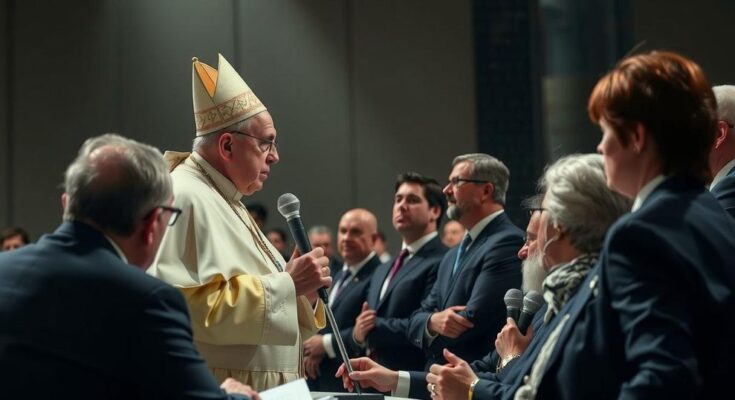The Vatican has obstructed discussions on women’s rights at COP29 by opposing references to gender, aligning with nations like Saudi Arabia and Russia, risking crucial support for women impacted by climate change. Colombian officials express determination to maintain gender-focused initiatives amid these tensions, highlighting the disproportionate effects of climate change on women. The negotiations face urgency as existing gender programs near expiration without resolution.
A significant confrontation has emerged at the COP29 climate summit in Azerbaijan, involving the Vatican’s opposition to discussions focused on women’s rights and gender issues. Reports indicate that Pope Francis’ representatives have allied with nations such as Saudi Arabia, Russia, Egypt, and Iran to hinder a proposed agreement aimed at enhancing support for women adversely affected by climate change. Colombian Environment Minister Susana Muhamad has raised concerns over the Vatican’s and its allies’ refusal to acknowledge the term “gender,” fearing inclusive references will encompass transgender women and LGBTQ+ individuals.
The stalemate poses a severe threat to vital assistance for women, who currently constitute 80% of those displaced by climate change according to UN estimates. Prosecuting this delay, Ms. Muhamad emphasized that Latin American countries are committed to preserving the gender program despite these challenges, asserting that disregard for women’s rights and human rights in climate talks is unacceptable.
The historical resistance from these nations against recognizing gender dynamics in climate-related discourse is also notable, with the Vatican and its allies not previously contesting the term “gender” in over a decade of negotiations. Advocacy groups have described their recent objection as a shocking shift in policy, stating it reflects a broader backlash against women’s and LGBTQ+ rights worldwide.
Notably, the acknowledgment that women disproportionately bear the brunt of climate change impacts has been a longstanding topic of concern among global leaders, yet the ongoing negotiations are marred by scant representation of women. Current UN data indicates that women constituted only 36% of the negotiating bodies last year, highlighting the critical need for inclusivity in these discussions.
As the expiration of the ten-year Lima Work Programme on Gender approaches, the failure to reach an agreement at COP29 may indefinitely compromise structured support for women facing climate challenges. The future of women’s rights and representation at such internationally significant dialogues stands precariously at this juncture, with urgency demanded to advocate for their rightful acknowledgment and support at climate negotiations.
The ongoing tensions at COP29 reflect a crucial intersection of climate action and gender rights, which has been a point of discussion within international forums for many years. The UN has emphasized the necessity of addressing the unique challenges women endure due to climatic changes, as they often are the most affected group in terms of displacement and resource accessibility. The Lima Work Programme on Gender was established to mitigate these disparities, yet recent developments indicate a regression in acknowledging and supporting such initiatives, particularly with regards to the intersectionality of gender, sexuality, and climate impact. With the backdrop of increasing global movements against identified rights, it becomes imperative to analyze the political and cultural factors influencing these negotiations.
In summary, the standoff at COP29 centered around the Vatican’s alliance with conservative countries against the recognition of gender issues has foregrounded serious concerns regarding women’s rights in climate discussions. The pushback against including terms relative to gender dynamics signifies a broader cultural backlash that could set back hard-won advances in addressing climate-related gender disparities. Depending on the resolutions achieved in the impending days, the future of women’s support in climate action may lapse into uncertainty, reinforcing the urgent need for more inclusive representation at such critical negotiations.
Original Source: www.bbc.com




